Ethics and Governance 2022 Report
VerifiedAdded on 2022/09/30
|14
|3283
|27
AI Summary
Contribute Materials
Your contribution can guide someone’s learning journey. Share your
documents today.
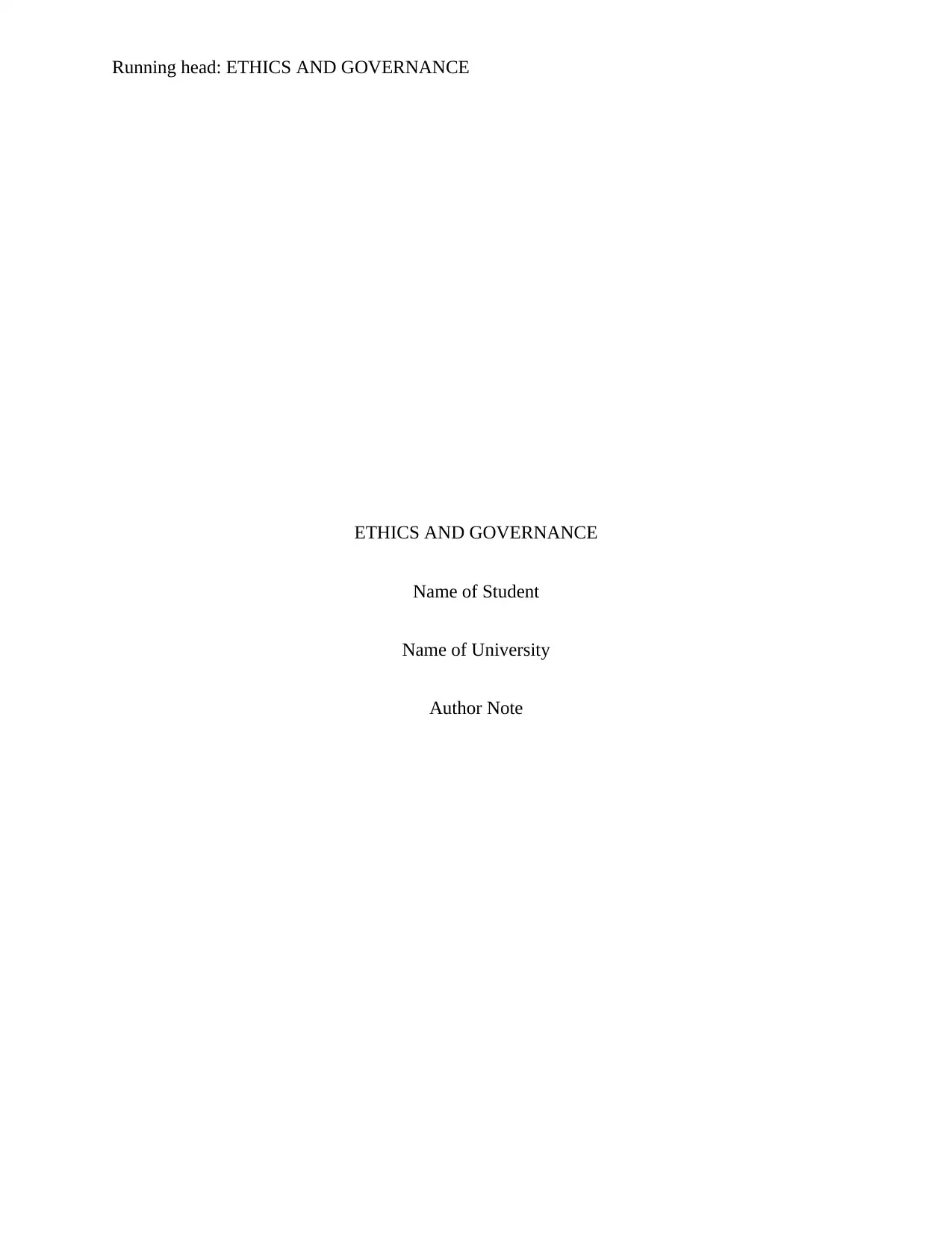
Running head: ETHICS AND GOVERNANCE
ETHICS AND GOVERNANCE
Name of Student
Name of University
Author Note
ETHICS AND GOVERNANCE
Name of Student
Name of University
Author Note
Secure Best Marks with AI Grader
Need help grading? Try our AI Grader for instant feedback on your assignments.
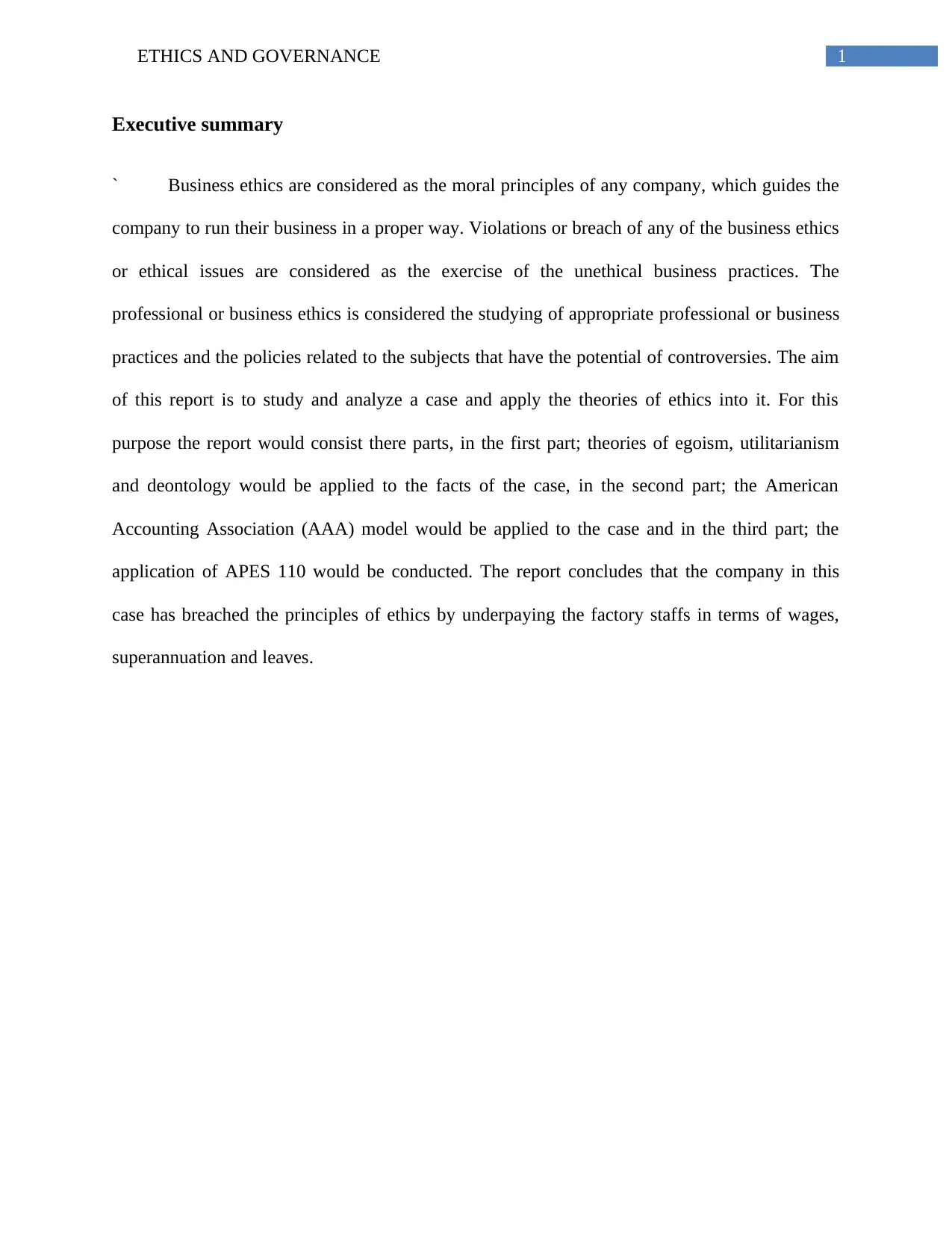
1ETHICS AND GOVERNANCE
Executive summary
` Business ethics are considered as the moral principles of any company, which guides the
company to run their business in a proper way. Violations or breach of any of the business ethics
or ethical issues are considered as the exercise of the unethical business practices. The
professional or business ethics is considered the studying of appropriate professional or business
practices and the policies related to the subjects that have the potential of controversies. The aim
of this report is to study and analyze a case and apply the theories of ethics into it. For this
purpose the report would consist there parts, in the first part; theories of egoism, utilitarianism
and deontology would be applied to the facts of the case, in the second part; the American
Accounting Association (AAA) model would be applied to the case and in the third part; the
application of APES 110 would be conducted. The report concludes that the company in this
case has breached the principles of ethics by underpaying the factory staffs in terms of wages,
superannuation and leaves.
Executive summary
` Business ethics are considered as the moral principles of any company, which guides the
company to run their business in a proper way. Violations or breach of any of the business ethics
or ethical issues are considered as the exercise of the unethical business practices. The
professional or business ethics is considered the studying of appropriate professional or business
practices and the policies related to the subjects that have the potential of controversies. The aim
of this report is to study and analyze a case and apply the theories of ethics into it. For this
purpose the report would consist there parts, in the first part; theories of egoism, utilitarianism
and deontology would be applied to the facts of the case, in the second part; the American
Accounting Association (AAA) model would be applied to the case and in the third part; the
application of APES 110 would be conducted. The report concludes that the company in this
case has breached the principles of ethics by underpaying the factory staffs in terms of wages,
superannuation and leaves.
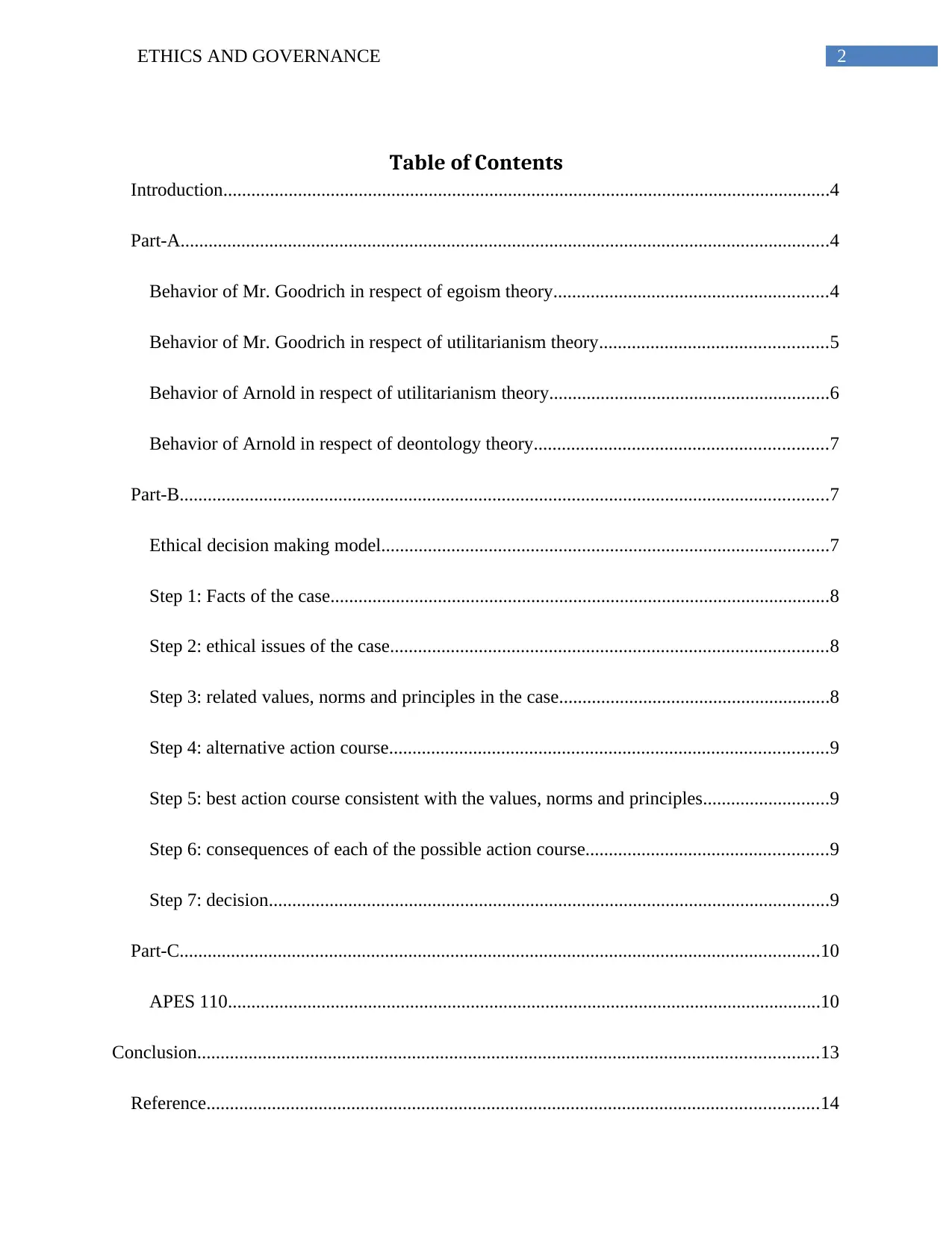
2ETHICS AND GOVERNANCE
Table of Contents
Introduction..................................................................................................................................4
Part-A...........................................................................................................................................4
Behavior of Mr. Goodrich in respect of egoism theory...........................................................4
Behavior of Mr. Goodrich in respect of utilitarianism theory.................................................5
Behavior of Arnold in respect of utilitarianism theory............................................................6
Behavior of Arnold in respect of deontology theory...............................................................7
Part-B...........................................................................................................................................7
Ethical decision making model................................................................................................7
Step 1: Facts of the case...........................................................................................................8
Step 2: ethical issues of the case..............................................................................................8
Step 3: related values, norms and principles in the case..........................................................8
Step 4: alternative action course..............................................................................................9
Step 5: best action course consistent with the values, norms and principles...........................9
Step 6: consequences of each of the possible action course....................................................9
Step 7: decision........................................................................................................................9
Part-C.........................................................................................................................................10
APES 110...............................................................................................................................10
Conclusion.....................................................................................................................................13
Reference...................................................................................................................................14
Table of Contents
Introduction..................................................................................................................................4
Part-A...........................................................................................................................................4
Behavior of Mr. Goodrich in respect of egoism theory...........................................................4
Behavior of Mr. Goodrich in respect of utilitarianism theory.................................................5
Behavior of Arnold in respect of utilitarianism theory............................................................6
Behavior of Arnold in respect of deontology theory...............................................................7
Part-B...........................................................................................................................................7
Ethical decision making model................................................................................................7
Step 1: Facts of the case...........................................................................................................8
Step 2: ethical issues of the case..............................................................................................8
Step 3: related values, norms and principles in the case..........................................................8
Step 4: alternative action course..............................................................................................9
Step 5: best action course consistent with the values, norms and principles...........................9
Step 6: consequences of each of the possible action course....................................................9
Step 7: decision........................................................................................................................9
Part-C.........................................................................................................................................10
APES 110...............................................................................................................................10
Conclusion.....................................................................................................................................13
Reference...................................................................................................................................14
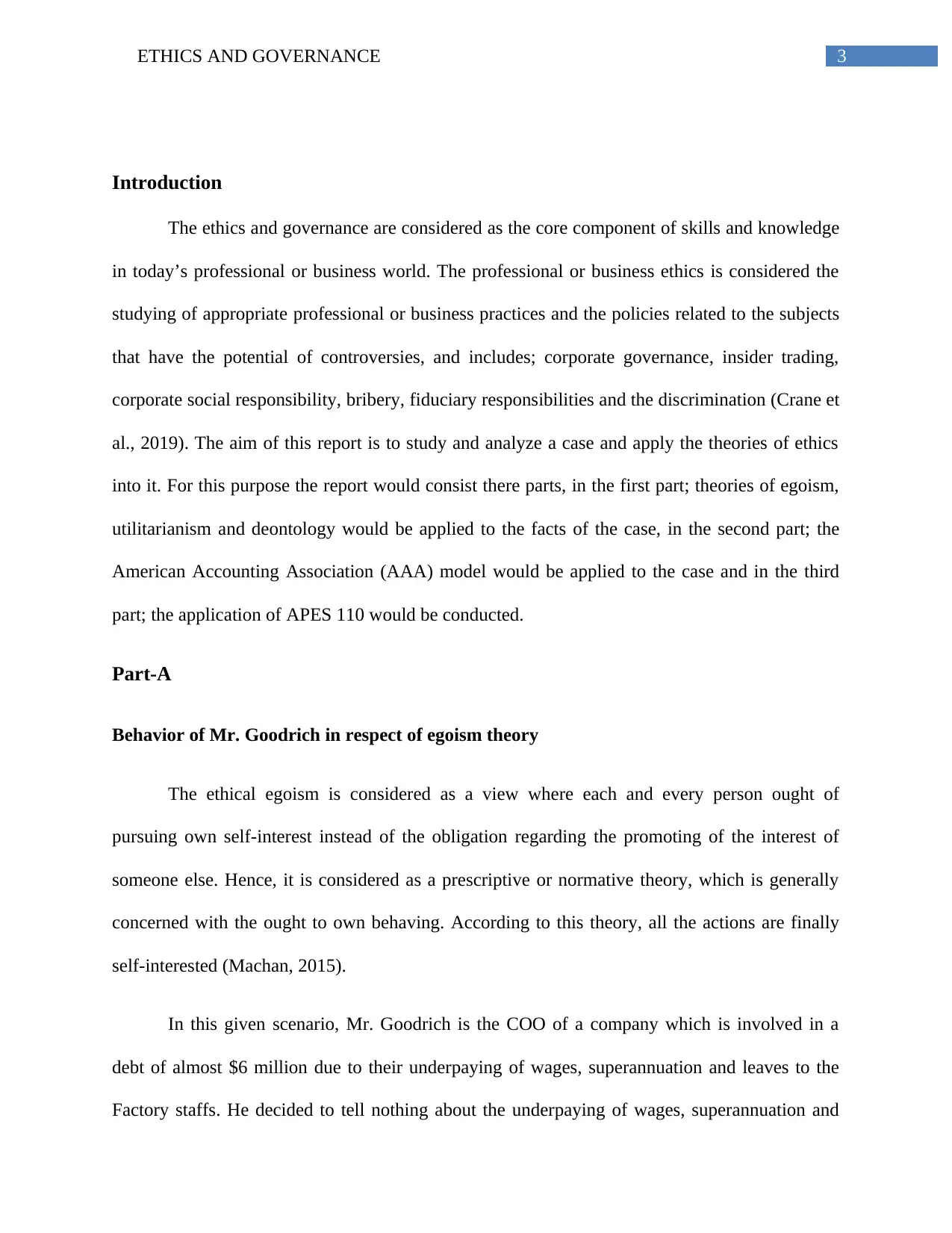
3ETHICS AND GOVERNANCE
Introduction
The ethics and governance are considered as the core component of skills and knowledge
in today’s professional or business world. The professional or business ethics is considered the
studying of appropriate professional or business practices and the policies related to the subjects
that have the potential of controversies, and includes; corporate governance, insider trading,
corporate social responsibility, bribery, fiduciary responsibilities and the discrimination (Crane et
al., 2019). The aim of this report is to study and analyze a case and apply the theories of ethics
into it. For this purpose the report would consist there parts, in the first part; theories of egoism,
utilitarianism and deontology would be applied to the facts of the case, in the second part; the
American Accounting Association (AAA) model would be applied to the case and in the third
part; the application of APES 110 would be conducted.
Part-A
Behavior of Mr. Goodrich in respect of egoism theory
The ethical egoism is considered as a view where each and every person ought of
pursuing own self-interest instead of the obligation regarding the promoting of the interest of
someone else. Hence, it is considered as a prescriptive or normative theory, which is generally
concerned with the ought to own behaving. According to this theory, all the actions are finally
self-interested (Machan, 2015).
In this given scenario, Mr. Goodrich is the COO of a company which is involved in a
debt of almost $6 million due to their underpaying of wages, superannuation and leaves to the
Factory staffs. He decided to tell nothing about the underpaying of wages, superannuation and
Introduction
The ethics and governance are considered as the core component of skills and knowledge
in today’s professional or business world. The professional or business ethics is considered the
studying of appropriate professional or business practices and the policies related to the subjects
that have the potential of controversies, and includes; corporate governance, insider trading,
corporate social responsibility, bribery, fiduciary responsibilities and the discrimination (Crane et
al., 2019). The aim of this report is to study and analyze a case and apply the theories of ethics
into it. For this purpose the report would consist there parts, in the first part; theories of egoism,
utilitarianism and deontology would be applied to the facts of the case, in the second part; the
American Accounting Association (AAA) model would be applied to the case and in the third
part; the application of APES 110 would be conducted.
Part-A
Behavior of Mr. Goodrich in respect of egoism theory
The ethical egoism is considered as a view where each and every person ought of
pursuing own self-interest instead of the obligation regarding the promoting of the interest of
someone else. Hence, it is considered as a prescriptive or normative theory, which is generally
concerned with the ought to own behaving. According to this theory, all the actions are finally
self-interested (Machan, 2015).
In this given scenario, Mr. Goodrich is the COO of a company which is involved in a
debt of almost $6 million due to their underpaying of wages, superannuation and leaves to the
Factory staffs. He decided to tell nothing about the underpaying of wages, superannuation and
Secure Best Marks with AI Grader
Need help grading? Try our AI Grader for instant feedback on your assignments.
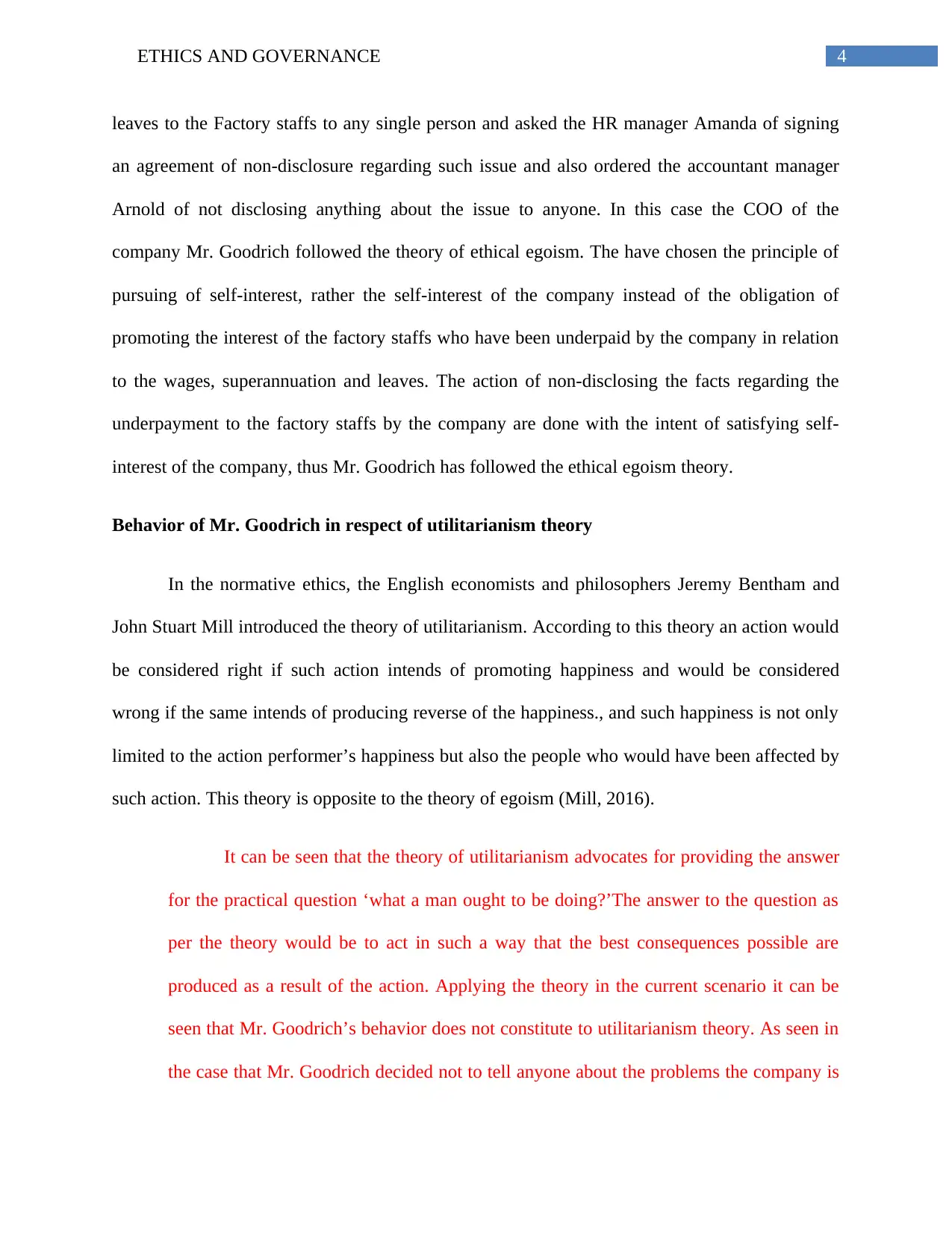
4ETHICS AND GOVERNANCE
leaves to the Factory staffs to any single person and asked the HR manager Amanda of signing
an agreement of non-disclosure regarding such issue and also ordered the accountant manager
Arnold of not disclosing anything about the issue to anyone. In this case the COO of the
company Mr. Goodrich followed the theory of ethical egoism. The have chosen the principle of
pursuing of self-interest, rather the self-interest of the company instead of the obligation of
promoting the interest of the factory staffs who have been underpaid by the company in relation
to the wages, superannuation and leaves. The action of non-disclosing the facts regarding the
underpayment to the factory staffs by the company are done with the intent of satisfying self-
interest of the company, thus Mr. Goodrich has followed the ethical egoism theory.
Behavior of Mr. Goodrich in respect of utilitarianism theory
In the normative ethics, the English economists and philosophers Jeremy Bentham and
John Stuart Mill introduced the theory of utilitarianism. According to this theory an action would
be considered right if such action intends of promoting happiness and would be considered
wrong if the same intends of producing reverse of the happiness., and such happiness is not only
limited to the action performer’s happiness but also the people who would have been affected by
such action. This theory is opposite to the theory of egoism (Mill, 2016).
It can be seen that the theory of utilitarianism advocates for providing the answer
for the practical question ‘what a man ought to be doing?’The answer to the question as
per the theory would be to act in such a way that the best consequences possible are
produced as a result of the action. Applying the theory in the current scenario it can be
seen that Mr. Goodrich’s behavior does not constitute to utilitarianism theory. As seen in
the case that Mr. Goodrich decided not to tell anyone about the problems the company is
leaves to the Factory staffs to any single person and asked the HR manager Amanda of signing
an agreement of non-disclosure regarding such issue and also ordered the accountant manager
Arnold of not disclosing anything about the issue to anyone. In this case the COO of the
company Mr. Goodrich followed the theory of ethical egoism. The have chosen the principle of
pursuing of self-interest, rather the self-interest of the company instead of the obligation of
promoting the interest of the factory staffs who have been underpaid by the company in relation
to the wages, superannuation and leaves. The action of non-disclosing the facts regarding the
underpayment to the factory staffs by the company are done with the intent of satisfying self-
interest of the company, thus Mr. Goodrich has followed the ethical egoism theory.
Behavior of Mr. Goodrich in respect of utilitarianism theory
In the normative ethics, the English economists and philosophers Jeremy Bentham and
John Stuart Mill introduced the theory of utilitarianism. According to this theory an action would
be considered right if such action intends of promoting happiness and would be considered
wrong if the same intends of producing reverse of the happiness., and such happiness is not only
limited to the action performer’s happiness but also the people who would have been affected by
such action. This theory is opposite to the theory of egoism (Mill, 2016).
It can be seen that the theory of utilitarianism advocates for providing the answer
for the practical question ‘what a man ought to be doing?’The answer to the question as
per the theory would be to act in such a way that the best consequences possible are
produced as a result of the action. Applying the theory in the current scenario it can be
seen that Mr. Goodrich’s behavior does not constitute to utilitarianism theory. As seen in
the case that Mr. Goodrich decided not to tell anyone about the problems the company is
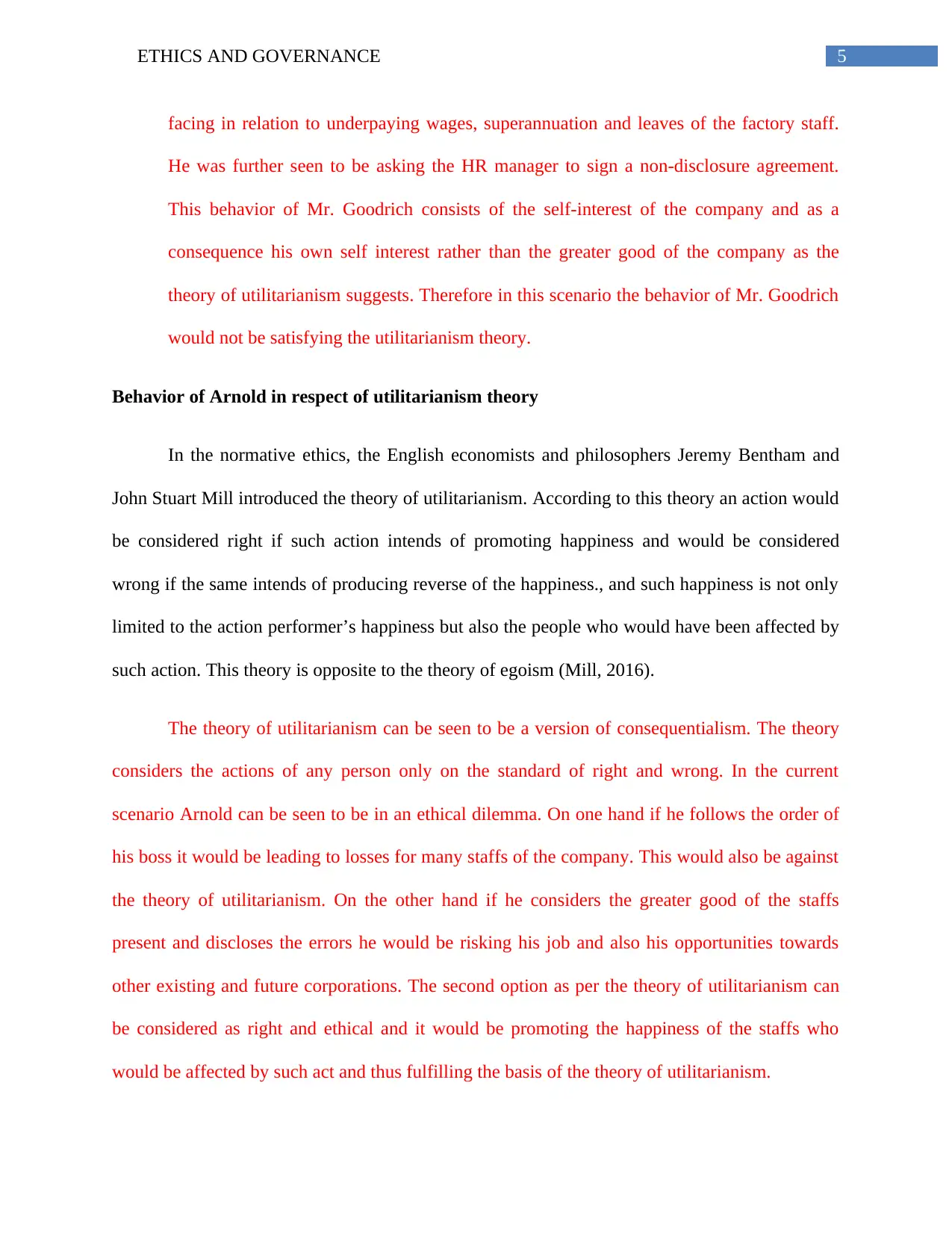
5ETHICS AND GOVERNANCE
facing in relation to underpaying wages, superannuation and leaves of the factory staff.
He was further seen to be asking the HR manager to sign a non-disclosure agreement.
This behavior of Mr. Goodrich consists of the self-interest of the company and as a
consequence his own self interest rather than the greater good of the company as the
theory of utilitarianism suggests. Therefore in this scenario the behavior of Mr. Goodrich
would not be satisfying the utilitarianism theory.
Behavior of Arnold in respect of utilitarianism theory
In the normative ethics, the English economists and philosophers Jeremy Bentham and
John Stuart Mill introduced the theory of utilitarianism. According to this theory an action would
be considered right if such action intends of promoting happiness and would be considered
wrong if the same intends of producing reverse of the happiness., and such happiness is not only
limited to the action performer’s happiness but also the people who would have been affected by
such action. This theory is opposite to the theory of egoism (Mill, 2016).
The theory of utilitarianism can be seen to be a version of consequentialism. The theory
considers the actions of any person only on the standard of right and wrong. In the current
scenario Arnold can be seen to be in an ethical dilemma. On one hand if he follows the order of
his boss it would be leading to losses for many staffs of the company. This would also be against
the theory of utilitarianism. On the other hand if he considers the greater good of the staffs
present and discloses the errors he would be risking his job and also his opportunities towards
other existing and future corporations. The second option as per the theory of utilitarianism can
be considered as right and ethical and it would be promoting the happiness of the staffs who
would be affected by such act and thus fulfilling the basis of the theory of utilitarianism.
facing in relation to underpaying wages, superannuation and leaves of the factory staff.
He was further seen to be asking the HR manager to sign a non-disclosure agreement.
This behavior of Mr. Goodrich consists of the self-interest of the company and as a
consequence his own self interest rather than the greater good of the company as the
theory of utilitarianism suggests. Therefore in this scenario the behavior of Mr. Goodrich
would not be satisfying the utilitarianism theory.
Behavior of Arnold in respect of utilitarianism theory
In the normative ethics, the English economists and philosophers Jeremy Bentham and
John Stuart Mill introduced the theory of utilitarianism. According to this theory an action would
be considered right if such action intends of promoting happiness and would be considered
wrong if the same intends of producing reverse of the happiness., and such happiness is not only
limited to the action performer’s happiness but also the people who would have been affected by
such action. This theory is opposite to the theory of egoism (Mill, 2016).
The theory of utilitarianism can be seen to be a version of consequentialism. The theory
considers the actions of any person only on the standard of right and wrong. In the current
scenario Arnold can be seen to be in an ethical dilemma. On one hand if he follows the order of
his boss it would be leading to losses for many staffs of the company. This would also be against
the theory of utilitarianism. On the other hand if he considers the greater good of the staffs
present and discloses the errors he would be risking his job and also his opportunities towards
other existing and future corporations. The second option as per the theory of utilitarianism can
be considered as right and ethical and it would be promoting the happiness of the staffs who
would be affected by such act and thus fulfilling the basis of the theory of utilitarianism.
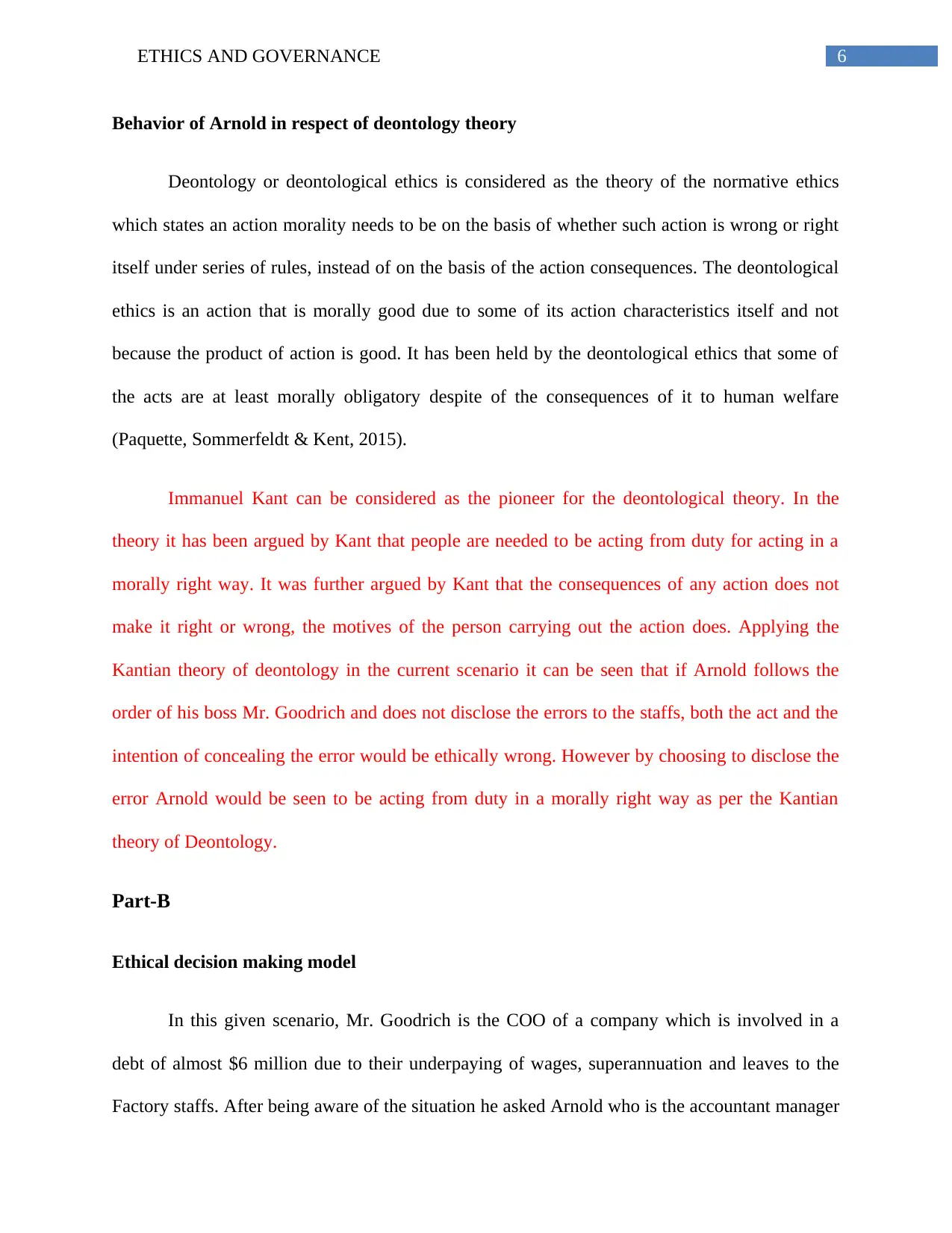
6ETHICS AND GOVERNANCE
Behavior of Arnold in respect of deontology theory
Deontology or deontological ethics is considered as the theory of the normative ethics
which states an action morality needs to be on the basis of whether such action is wrong or right
itself under series of rules, instead of on the basis of the action consequences. The deontological
ethics is an action that is morally good due to some of its action characteristics itself and not
because the product of action is good. It has been held by the deontological ethics that some of
the acts are at least morally obligatory despite of the consequences of it to human welfare
(Paquette, Sommerfeldt & Kent, 2015).
Immanuel Kant can be considered as the pioneer for the deontological theory. In the
theory it has been argued by Kant that people are needed to be acting from duty for acting in a
morally right way. It was further argued by Kant that the consequences of any action does not
make it right or wrong, the motives of the person carrying out the action does. Applying the
Kantian theory of deontology in the current scenario it can be seen that if Arnold follows the
order of his boss Mr. Goodrich and does not disclose the errors to the staffs, both the act and the
intention of concealing the error would be ethically wrong. However by choosing to disclose the
error Arnold would be seen to be acting from duty in a morally right way as per the Kantian
theory of Deontology.
Part-B
Ethical decision making model
In this given scenario, Mr. Goodrich is the COO of a company which is involved in a
debt of almost $6 million due to their underpaying of wages, superannuation and leaves to the
Factory staffs. After being aware of the situation he asked Arnold who is the accountant manager
Behavior of Arnold in respect of deontology theory
Deontology or deontological ethics is considered as the theory of the normative ethics
which states an action morality needs to be on the basis of whether such action is wrong or right
itself under series of rules, instead of on the basis of the action consequences. The deontological
ethics is an action that is morally good due to some of its action characteristics itself and not
because the product of action is good. It has been held by the deontological ethics that some of
the acts are at least morally obligatory despite of the consequences of it to human welfare
(Paquette, Sommerfeldt & Kent, 2015).
Immanuel Kant can be considered as the pioneer for the deontological theory. In the
theory it has been argued by Kant that people are needed to be acting from duty for acting in a
morally right way. It was further argued by Kant that the consequences of any action does not
make it right or wrong, the motives of the person carrying out the action does. Applying the
Kantian theory of deontology in the current scenario it can be seen that if Arnold follows the
order of his boss Mr. Goodrich and does not disclose the errors to the staffs, both the act and the
intention of concealing the error would be ethically wrong. However by choosing to disclose the
error Arnold would be seen to be acting from duty in a morally right way as per the Kantian
theory of Deontology.
Part-B
Ethical decision making model
In this given scenario, Mr. Goodrich is the COO of a company which is involved in a
debt of almost $6 million due to their underpaying of wages, superannuation and leaves to the
Factory staffs. After being aware of the situation he asked Arnold who is the accountant manager
Paraphrase This Document
Need a fresh take? Get an instant paraphrase of this document with our AI Paraphraser
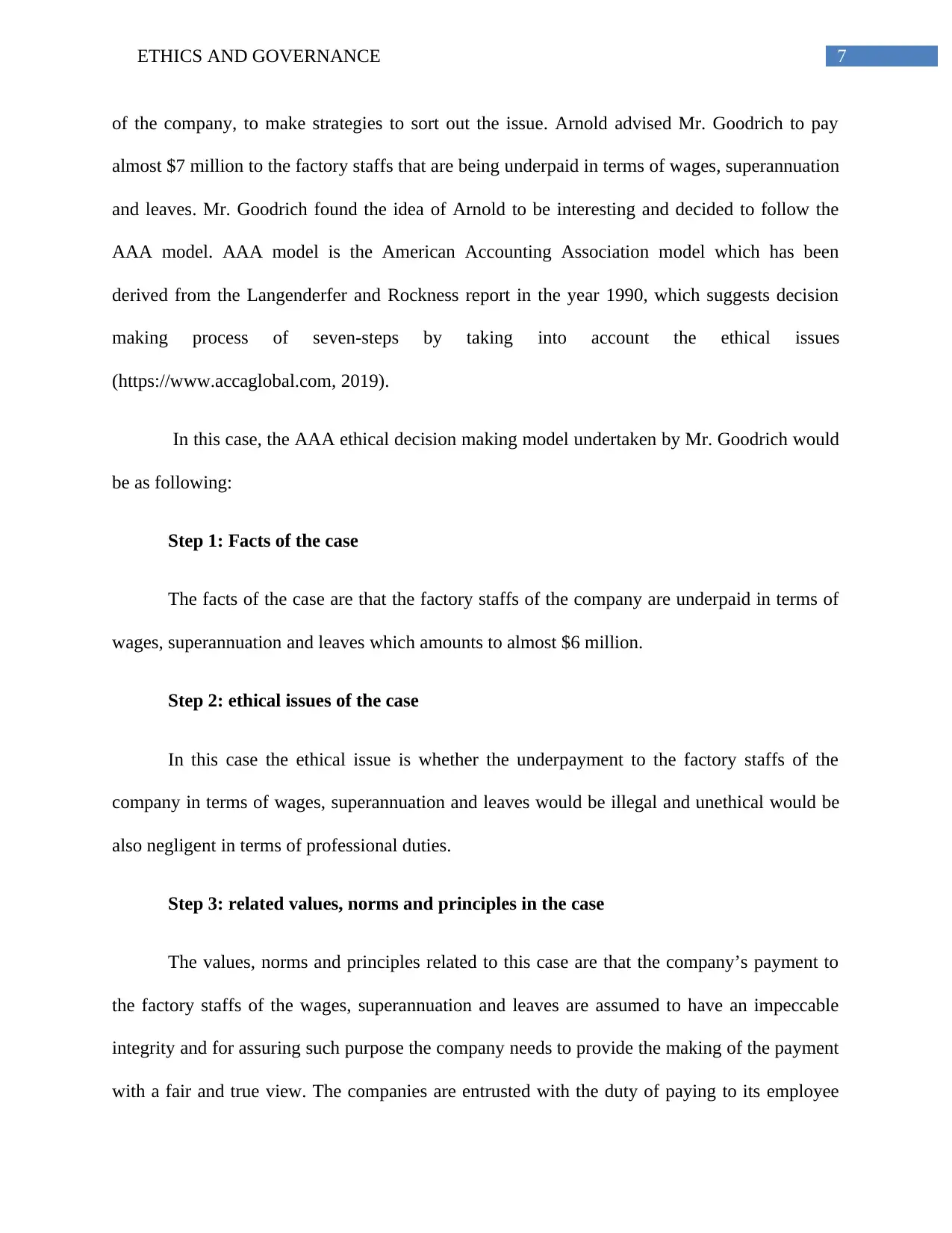
7ETHICS AND GOVERNANCE
of the company, to make strategies to sort out the issue. Arnold advised Mr. Goodrich to pay
almost $7 million to the factory staffs that are being underpaid in terms of wages, superannuation
and leaves. Mr. Goodrich found the idea of Arnold to be interesting and decided to follow the
AAA model. AAA model is the American Accounting Association model which has been
derived from the Langenderfer and Rockness report in the year 1990, which suggests decision
making process of seven-steps by taking into account the ethical issues
(https://www.accaglobal.com, 2019).
In this case, the AAA ethical decision making model undertaken by Mr. Goodrich would
be as following:
Step 1: Facts of the case
The facts of the case are that the factory staffs of the company are underpaid in terms of
wages, superannuation and leaves which amounts to almost $6 million.
Step 2: ethical issues of the case
In this case the ethical issue is whether the underpayment to the factory staffs of the
company in terms of wages, superannuation and leaves would be illegal and unethical would be
also negligent in terms of professional duties.
Step 3: related values, norms and principles in the case
The values, norms and principles related to this case are that the company’s payment to
the factory staffs of the wages, superannuation and leaves are assumed to have an impeccable
integrity and for assuring such purpose the company needs to provide the making of the payment
with a fair and true view. The companies are entrusted with the duty of paying to its employee
of the company, to make strategies to sort out the issue. Arnold advised Mr. Goodrich to pay
almost $7 million to the factory staffs that are being underpaid in terms of wages, superannuation
and leaves. Mr. Goodrich found the idea of Arnold to be interesting and decided to follow the
AAA model. AAA model is the American Accounting Association model which has been
derived from the Langenderfer and Rockness report in the year 1990, which suggests decision
making process of seven-steps by taking into account the ethical issues
(https://www.accaglobal.com, 2019).
In this case, the AAA ethical decision making model undertaken by Mr. Goodrich would
be as following:
Step 1: Facts of the case
The facts of the case are that the factory staffs of the company are underpaid in terms of
wages, superannuation and leaves which amounts to almost $6 million.
Step 2: ethical issues of the case
In this case the ethical issue is whether the underpayment to the factory staffs of the
company in terms of wages, superannuation and leaves would be illegal and unethical would be
also negligent in terms of professional duties.
Step 3: related values, norms and principles in the case
The values, norms and principles related to this case are that the company’s payment to
the factory staffs of the wages, superannuation and leaves are assumed to have an impeccable
integrity and for assuring such purpose the company needs to provide the making of the payment
with a fair and true view. The companies are entrusted with the duty of paying to its employee
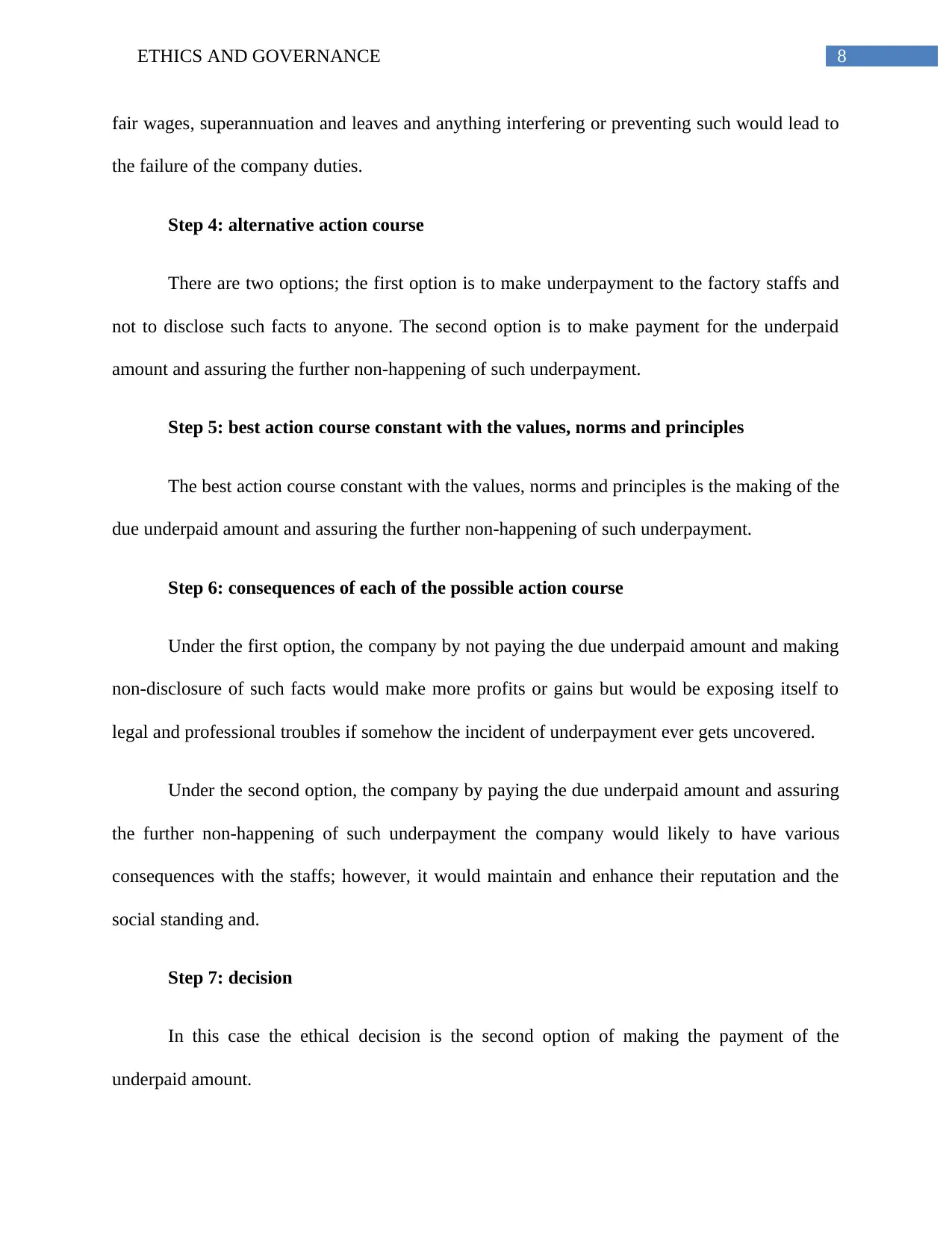
8ETHICS AND GOVERNANCE
fair wages, superannuation and leaves and anything interfering or preventing such would lead to
the failure of the company duties.
Step 4: alternative action course
There are two options; the first option is to make underpayment to the factory staffs and
not to disclose such facts to anyone. The second option is to make payment for the underpaid
amount and assuring the further non-happening of such underpayment.
Step 5: best action course constant with the values, norms and principles
The best action course constant with the values, norms and principles is the making of the
due underpaid amount and assuring the further non-happening of such underpayment.
Step 6: consequences of each of the possible action course
Under the first option, the company by not paying the due underpaid amount and making
non-disclosure of such facts would make more profits or gains but would be exposing itself to
legal and professional troubles if somehow the incident of underpayment ever gets uncovered.
Under the second option, the company by paying the due underpaid amount and assuring
the further non-happening of such underpayment the company would likely to have various
consequences with the staffs; however, it would maintain and enhance their reputation and the
social standing and.
Step 7: decision
In this case the ethical decision is the second option of making the payment of the
underpaid amount.
fair wages, superannuation and leaves and anything interfering or preventing such would lead to
the failure of the company duties.
Step 4: alternative action course
There are two options; the first option is to make underpayment to the factory staffs and
not to disclose such facts to anyone. The second option is to make payment for the underpaid
amount and assuring the further non-happening of such underpayment.
Step 5: best action course constant with the values, norms and principles
The best action course constant with the values, norms and principles is the making of the
due underpaid amount and assuring the further non-happening of such underpayment.
Step 6: consequences of each of the possible action course
Under the first option, the company by not paying the due underpaid amount and making
non-disclosure of such facts would make more profits or gains but would be exposing itself to
legal and professional troubles if somehow the incident of underpayment ever gets uncovered.
Under the second option, the company by paying the due underpaid amount and assuring
the further non-happening of such underpayment the company would likely to have various
consequences with the staffs; however, it would maintain and enhance their reputation and the
social standing and.
Step 7: decision
In this case the ethical decision is the second option of making the payment of the
underpaid amount.
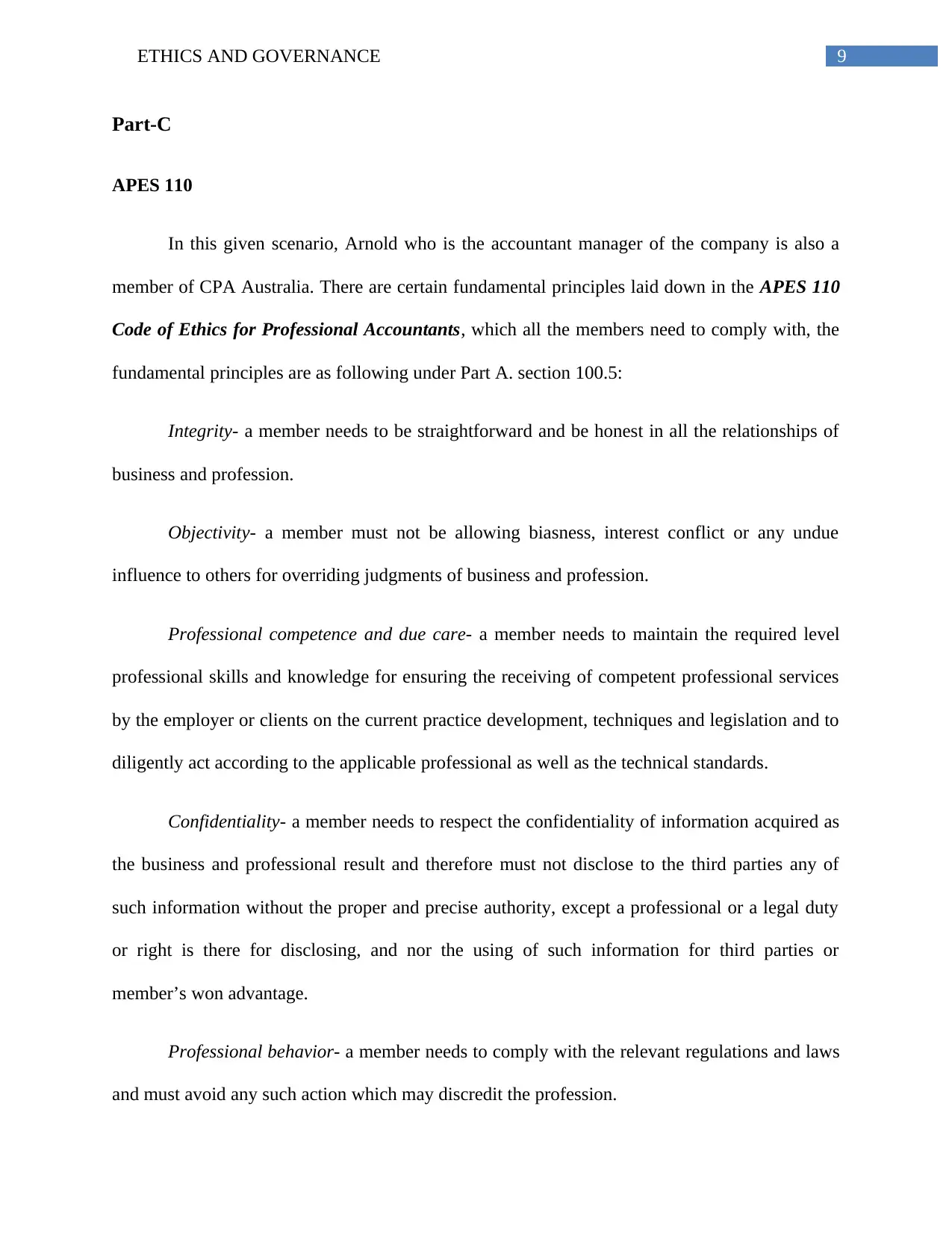
9ETHICS AND GOVERNANCE
Part-C
APES 110
In this given scenario, Arnold who is the accountant manager of the company is also a
member of CPA Australia. There are certain fundamental principles laid down in the APES 110
Code of Ethics for Professional Accountants, which all the members need to comply with, the
fundamental principles are as following under Part A. section 100.5:
Integrity- a member needs to be straightforward and be honest in all the relationships of
business and profession.
Objectivity- a member must not be allowing biasness, interest conflict or any undue
influence to others for overriding judgments of business and profession.
Professional competence and due care- a member needs to maintain the required level
professional skills and knowledge for ensuring the receiving of competent professional services
by the employer or clients on the current practice development, techniques and legislation and to
diligently act according to the applicable professional as well as the technical standards.
Confidentiality- a member needs to respect the confidentiality of information acquired as
the business and professional result and therefore must not disclose to the third parties any of
such information without the proper and precise authority, except a professional or a legal duty
or right is there for disclosing, and nor the using of such information for third parties or
member’s won advantage.
Professional behavior- a member needs to comply with the relevant regulations and laws
and must avoid any such action which may discredit the profession.
Part-C
APES 110
In this given scenario, Arnold who is the accountant manager of the company is also a
member of CPA Australia. There are certain fundamental principles laid down in the APES 110
Code of Ethics for Professional Accountants, which all the members need to comply with, the
fundamental principles are as following under Part A. section 100.5:
Integrity- a member needs to be straightforward and be honest in all the relationships of
business and profession.
Objectivity- a member must not be allowing biasness, interest conflict or any undue
influence to others for overriding judgments of business and profession.
Professional competence and due care- a member needs to maintain the required level
professional skills and knowledge for ensuring the receiving of competent professional services
by the employer or clients on the current practice development, techniques and legislation and to
diligently act according to the applicable professional as well as the technical standards.
Confidentiality- a member needs to respect the confidentiality of information acquired as
the business and professional result and therefore must not disclose to the third parties any of
such information without the proper and precise authority, except a professional or a legal duty
or right is there for disclosing, and nor the using of such information for third parties or
member’s won advantage.
Professional behavior- a member needs to comply with the relevant regulations and laws
and must avoid any such action which may discredit the profession.
Secure Best Marks with AI Grader
Need help grading? Try our AI Grader for instant feedback on your assignments.
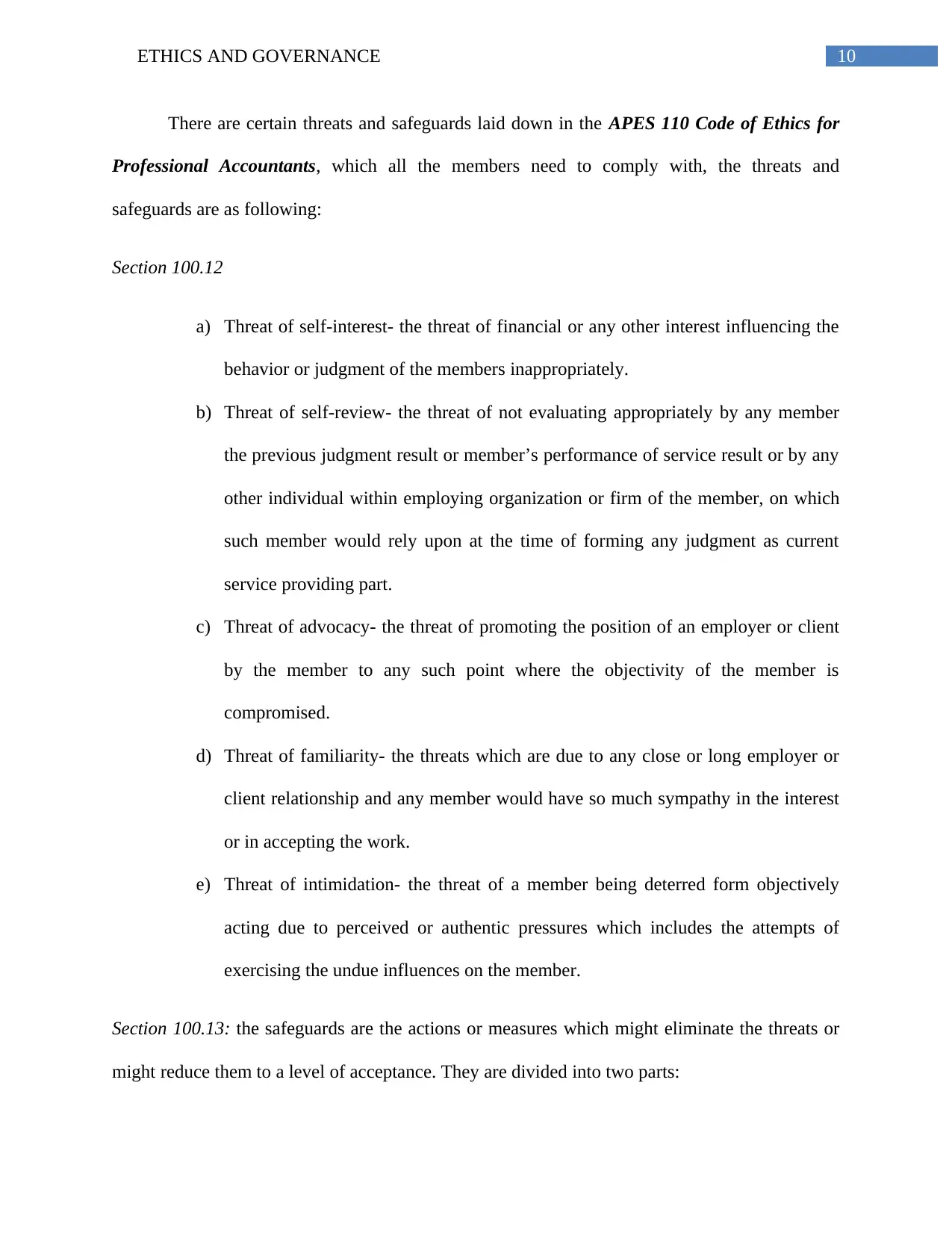
10ETHICS AND GOVERNANCE
There are certain threats and safeguards laid down in the APES 110 Code of Ethics for
Professional Accountants, which all the members need to comply with, the threats and
safeguards are as following:
Section 100.12
a) Threat of self-interest- the threat of financial or any other interest influencing the
behavior or judgment of the members inappropriately.
b) Threat of self-review- the threat of not evaluating appropriately by any member
the previous judgment result or member’s performance of service result or by any
other individual within employing organization or firm of the member, on which
such member would rely upon at the time of forming any judgment as current
service providing part.
c) Threat of advocacy- the threat of promoting the position of an employer or client
by the member to any such point where the objectivity of the member is
compromised.
d) Threat of familiarity- the threats which are due to any close or long employer or
client relationship and any member would have so much sympathy in the interest
or in accepting the work.
e) Threat of intimidation- the threat of a member being deterred form objectively
acting due to perceived or authentic pressures which includes the attempts of
exercising the undue influences on the member.
Section 100.13: the safeguards are the actions or measures which might eliminate the threats or
might reduce them to a level of acceptance. They are divided into two parts:
There are certain threats and safeguards laid down in the APES 110 Code of Ethics for
Professional Accountants, which all the members need to comply with, the threats and
safeguards are as following:
Section 100.12
a) Threat of self-interest- the threat of financial or any other interest influencing the
behavior or judgment of the members inappropriately.
b) Threat of self-review- the threat of not evaluating appropriately by any member
the previous judgment result or member’s performance of service result or by any
other individual within employing organization or firm of the member, on which
such member would rely upon at the time of forming any judgment as current
service providing part.
c) Threat of advocacy- the threat of promoting the position of an employer or client
by the member to any such point where the objectivity of the member is
compromised.
d) Threat of familiarity- the threats which are due to any close or long employer or
client relationship and any member would have so much sympathy in the interest
or in accepting the work.
e) Threat of intimidation- the threat of a member being deterred form objectively
acting due to perceived or authentic pressures which includes the attempts of
exercising the undue influences on the member.
Section 100.13: the safeguards are the actions or measures which might eliminate the threats or
might reduce them to a level of acceptance. They are divided into two parts:
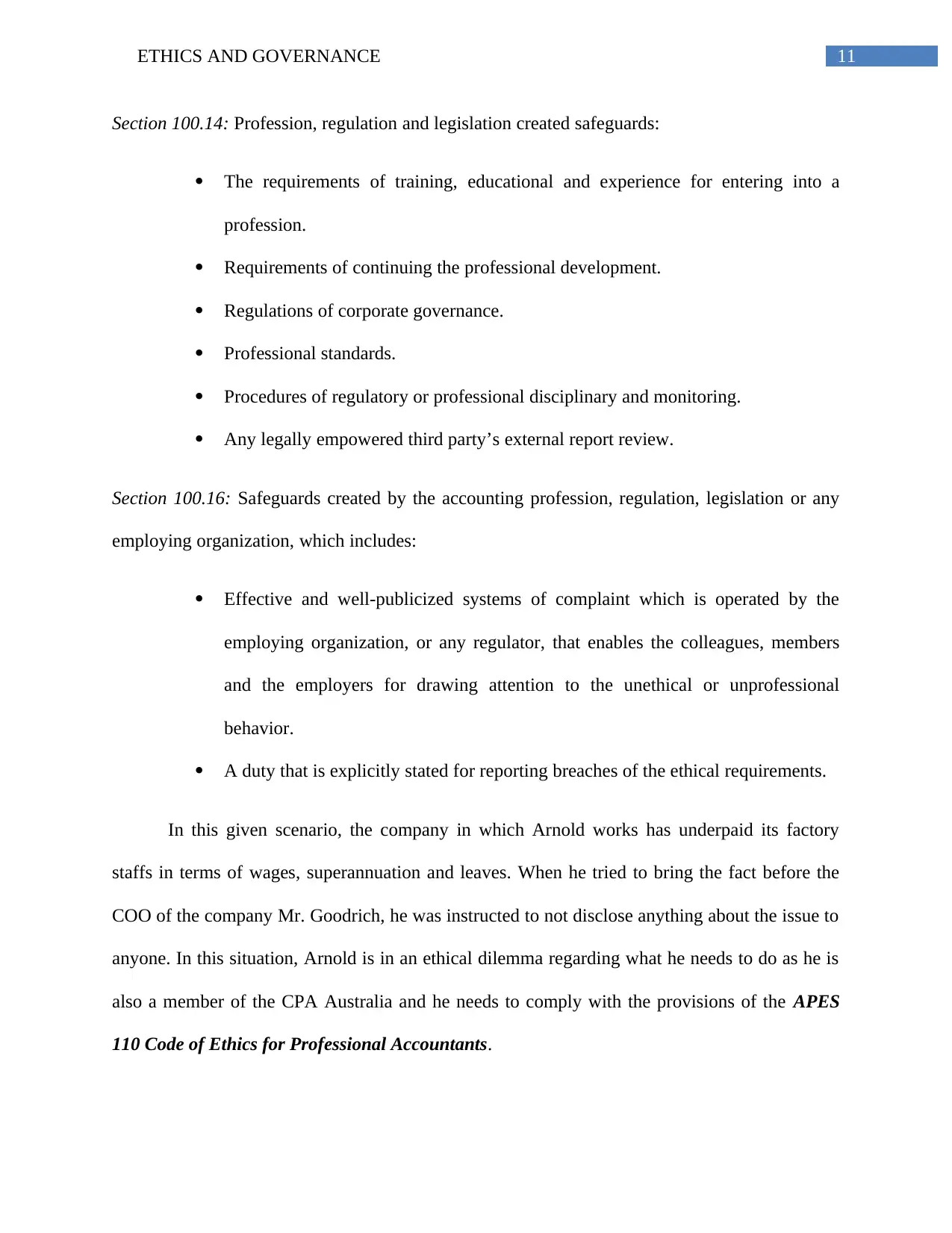
11ETHICS AND GOVERNANCE
Section 100.14: Profession, regulation and legislation created safeguards:
The requirements of training, educational and experience for entering into a
profession.
Requirements of continuing the professional development.
Regulations of corporate governance.
Professional standards.
Procedures of regulatory or professional disciplinary and monitoring.
Any legally empowered third party’s external report review.
Section 100.16: Safeguards created by the accounting profession, regulation, legislation or any
employing organization, which includes:
Effective and well-publicized systems of complaint which is operated by the
employing organization, or any regulator, that enables the colleagues, members
and the employers for drawing attention to the unethical or unprofessional
behavior.
A duty that is explicitly stated for reporting breaches of the ethical requirements.
In this given scenario, the company in which Arnold works has underpaid its factory
staffs in terms of wages, superannuation and leaves. When he tried to bring the fact before the
COO of the company Mr. Goodrich, he was instructed to not disclose anything about the issue to
anyone. In this situation, Arnold is in an ethical dilemma regarding what he needs to do as he is
also a member of the CPA Australia and he needs to comply with the provisions of the APES
110 Code of Ethics for Professional Accountants.
Section 100.14: Profession, regulation and legislation created safeguards:
The requirements of training, educational and experience for entering into a
profession.
Requirements of continuing the professional development.
Regulations of corporate governance.
Professional standards.
Procedures of regulatory or professional disciplinary and monitoring.
Any legally empowered third party’s external report review.
Section 100.16: Safeguards created by the accounting profession, regulation, legislation or any
employing organization, which includes:
Effective and well-publicized systems of complaint which is operated by the
employing organization, or any regulator, that enables the colleagues, members
and the employers for drawing attention to the unethical or unprofessional
behavior.
A duty that is explicitly stated for reporting breaches of the ethical requirements.
In this given scenario, the company in which Arnold works has underpaid its factory
staffs in terms of wages, superannuation and leaves. When he tried to bring the fact before the
COO of the company Mr. Goodrich, he was instructed to not disclose anything about the issue to
anyone. In this situation, Arnold is in an ethical dilemma regarding what he needs to do as he is
also a member of the CPA Australia and he needs to comply with the provisions of the APES
110 Code of Ethics for Professional Accountants.
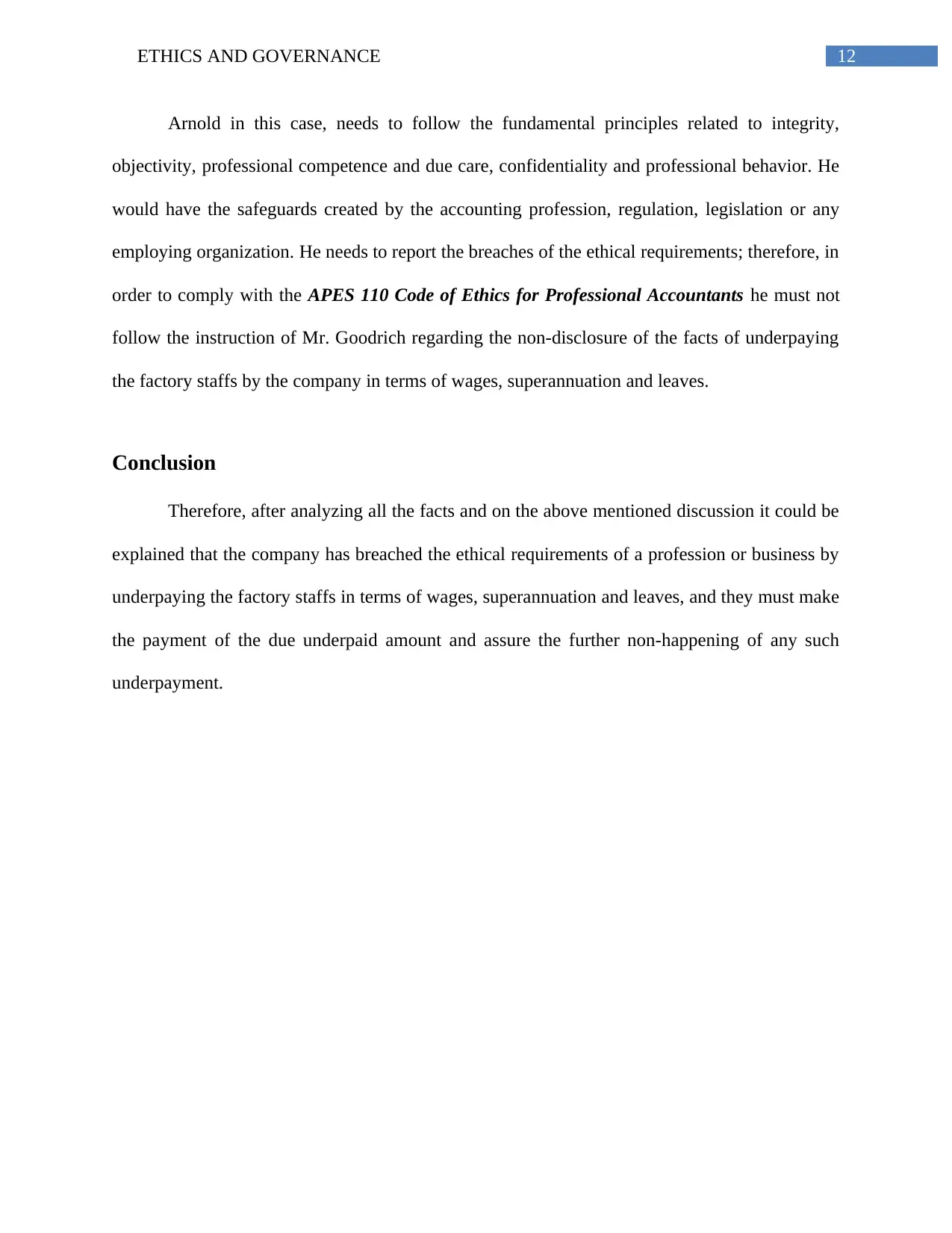
12ETHICS AND GOVERNANCE
Arnold in this case, needs to follow the fundamental principles related to integrity,
objectivity, professional competence and due care, confidentiality and professional behavior. He
would have the safeguards created by the accounting profession, regulation, legislation or any
employing organization. He needs to report the breaches of the ethical requirements; therefore, in
order to comply with the APES 110 Code of Ethics for Professional Accountants he must not
follow the instruction of Mr. Goodrich regarding the non-disclosure of the facts of underpaying
the factory staffs by the company in terms of wages, superannuation and leaves.
Conclusion
Therefore, after analyzing all the facts and on the above mentioned discussion it could be
explained that the company has breached the ethical requirements of a profession or business by
underpaying the factory staffs in terms of wages, superannuation and leaves, and they must make
the payment of the due underpaid amount and assure the further non-happening of any such
underpayment.
Arnold in this case, needs to follow the fundamental principles related to integrity,
objectivity, professional competence and due care, confidentiality and professional behavior. He
would have the safeguards created by the accounting profession, regulation, legislation or any
employing organization. He needs to report the breaches of the ethical requirements; therefore, in
order to comply with the APES 110 Code of Ethics for Professional Accountants he must not
follow the instruction of Mr. Goodrich regarding the non-disclosure of the facts of underpaying
the factory staffs by the company in terms of wages, superannuation and leaves.
Conclusion
Therefore, after analyzing all the facts and on the above mentioned discussion it could be
explained that the company has breached the ethical requirements of a profession or business by
underpaying the factory staffs in terms of wages, superannuation and leaves, and they must make
the payment of the due underpaid amount and assure the further non-happening of any such
underpayment.
Paraphrase This Document
Need a fresh take? Get an instant paraphrase of this document with our AI Paraphraser
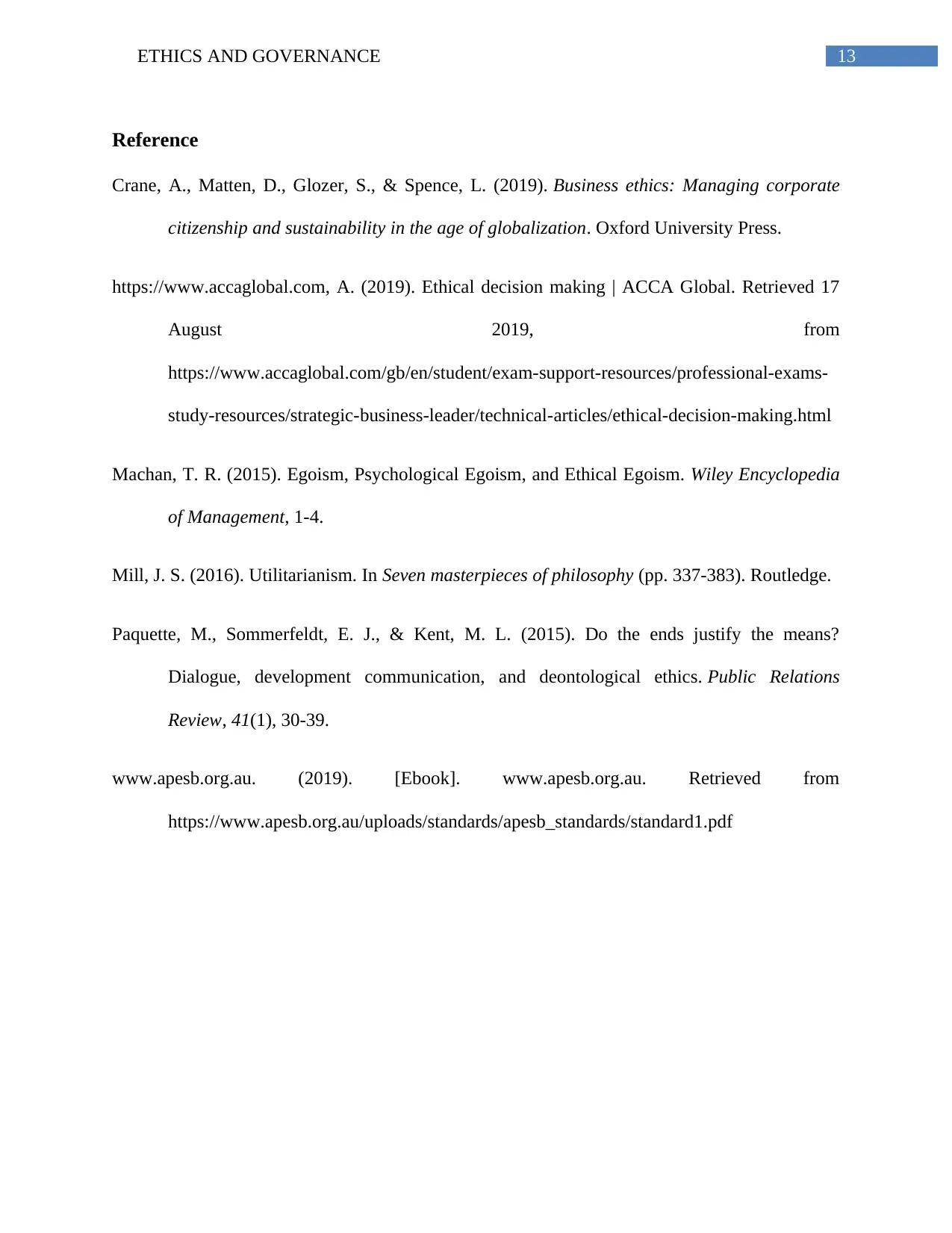
13ETHICS AND GOVERNANCE
Reference
Crane, A., Matten, D., Glozer, S., & Spence, L. (2019). Business ethics: Managing corporate
citizenship and sustainability in the age of globalization. Oxford University Press.
https://www.accaglobal.com, A. (2019). Ethical decision making | ACCA Global. Retrieved 17
August 2019, from
https://www.accaglobal.com/gb/en/student/exam-support-resources/professional-exams-
study-resources/strategic-business-leader/technical-articles/ethical-decision-making.html
Machan, T. R. (2015). Egoism, Psychological Egoism, and Ethical Egoism. Wiley Encyclopedia
of Management, 1-4.
Mill, J. S. (2016). Utilitarianism. In Seven masterpieces of philosophy (pp. 337-383). Routledge.
Paquette, M., Sommerfeldt, E. J., & Kent, M. L. (2015). Do the ends justify the means?
Dialogue, development communication, and deontological ethics. Public Relations
Review, 41(1), 30-39.
www.apesb.org.au. (2019). [Ebook]. www.apesb.org.au. Retrieved from
https://www.apesb.org.au/uploads/standards/apesb_standards/standard1.pdf
Reference
Crane, A., Matten, D., Glozer, S., & Spence, L. (2019). Business ethics: Managing corporate
citizenship and sustainability in the age of globalization. Oxford University Press.
https://www.accaglobal.com, A. (2019). Ethical decision making | ACCA Global. Retrieved 17
August 2019, from
https://www.accaglobal.com/gb/en/student/exam-support-resources/professional-exams-
study-resources/strategic-business-leader/technical-articles/ethical-decision-making.html
Machan, T. R. (2015). Egoism, Psychological Egoism, and Ethical Egoism. Wiley Encyclopedia
of Management, 1-4.
Mill, J. S. (2016). Utilitarianism. In Seven masterpieces of philosophy (pp. 337-383). Routledge.
Paquette, M., Sommerfeldt, E. J., & Kent, M. L. (2015). Do the ends justify the means?
Dialogue, development communication, and deontological ethics. Public Relations
Review, 41(1), 30-39.
www.apesb.org.au. (2019). [Ebook]. www.apesb.org.au. Retrieved from
https://www.apesb.org.au/uploads/standards/apesb_standards/standard1.pdf
1 out of 14
Related Documents
Your All-in-One AI-Powered Toolkit for Academic Success.
+13062052269
info@desklib.com
Available 24*7 on WhatsApp / Email
![[object Object]](/_next/static/media/star-bottom.7253800d.svg)
Unlock your academic potential
© 2024 | Zucol Services PVT LTD | All rights reserved.





